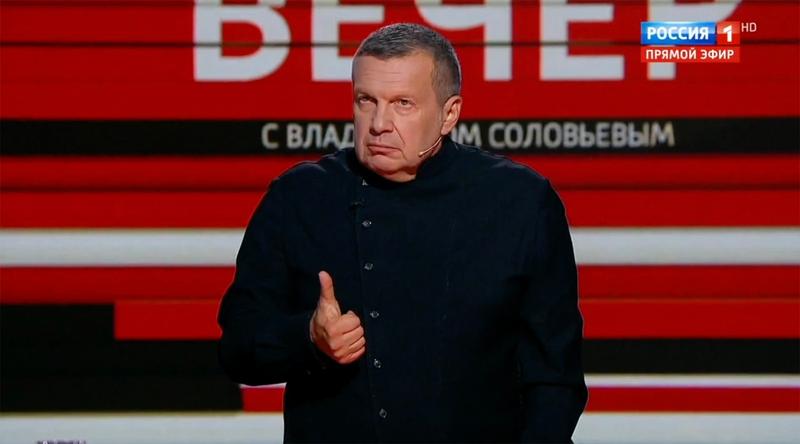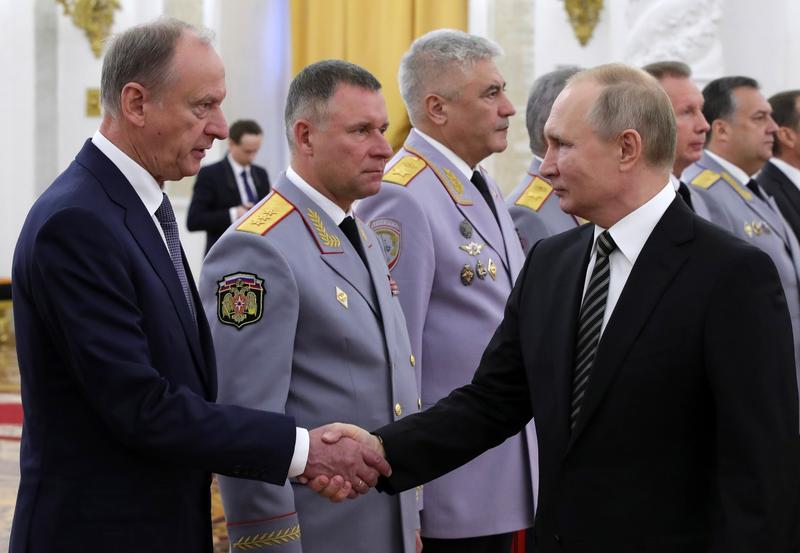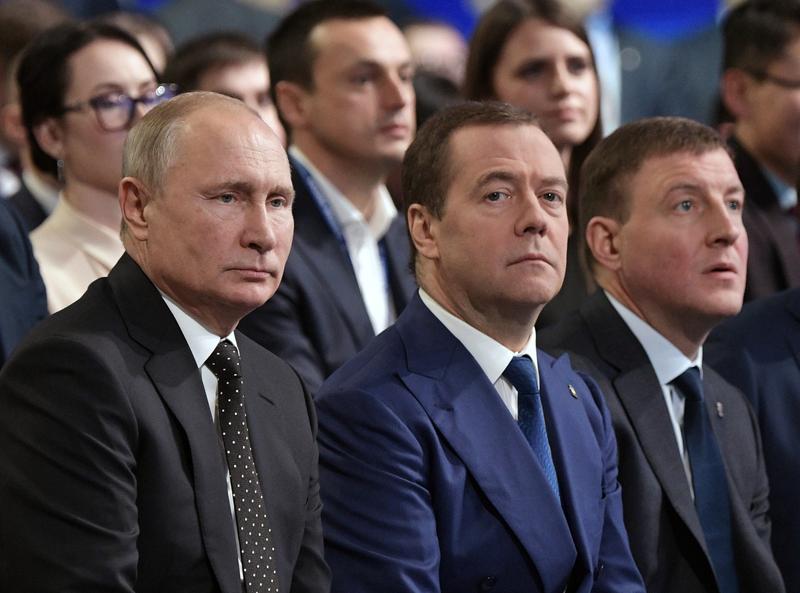Anyone remotely familiar with the nature of the war debates on Russian state television is aware of the tendency of some hardliners to support extreme measures.
Ballistic nuclear missiles on military parade in MoscowPhoto: Russia Ivanov Arkady / Alamy / Alamy / Profimedia
In this vein, one prominent campaigner suggested that Russia use nuclear weapons on the UK to prevent the West from helping Ukraine in its ongoing war. Sky News.
TV host Vladimir Solovyov, a friend of Vladimir Putin, has often used his radio and television programs to attack the West and use the Kremlin’s nuclear capabilities to invade Ukraine.
A clip of his latest atrocity, shared online by Russian insider journalist Frances Starr, shows Solovyov trying to tell his colleagues that Russia should attack Britain.
“Actually, I’m testing Poseidon right now… in England,” he says, prompting seemingly incredulous laughter from the other commentators on the show.
Poseidon, formerly known by the Russian codename Status-6, is an autonomous, unmanned, nuclear-powered underwater vehicle manufactured by the Rubin Design Bureau, capable of both conventional and nuclear launches.
Vladimir SoloviovPhoto: Willvest News / Profimedia Images
“I’m not suggesting that we sink the small island,” the Russian propagandist said, but “the important thing is that they have no doubt that we are ready to use nuclear weapons.”
“And I don’t give a damn if we go and sink anything carrying tanks. The US not only doubts Russia won’t use nuclear weapons, it’s certain they won’t!” warns that.
“This is why the famous bastard Blinken convinced Biden to give the green light to supply F-16s. He said Russia won’t do anything. So we have to nuke them!”, jokes the host.
Another commentator on the program, Andrei Sidorov, countered this argument – “No, no, no: listen! I’m not against using nuclear bombs, I don’t want to get their answer.”
Government officials increasingly broadcast the threat of nuclear weapons
According to reports, the Secretary of the Security Council in Moscow, Nikolai Patrushev, recently said that Russia is capable of destroying any enemy, including the United States, if its existence is threatened. Interfax.
“Forgetting the lessons of history, some in the West are already talking about revenge, which will lead to a military victory over Russia. Let’s say one thing. Russia is patient and does not intimidate anyone with its military advantage. But it has unique modern weapons capable of destroying any enemy, including the United States, if its existence is threatened,” Patrushev said in an interview. Rosyskaya Gazeta.
Patrushev, considered Putin’s ideologue on security and foreign policy issues and the leader’s heir apparent in the Kremlin, has described the US’s ability to launch an offensive in the face of direct conflict as “short-sighted nonsense.” A preemptive missile attack, after which Russia cannot respond.
Nikolay Petruchev with Vladimir Putin Photo: Mikhail Klimentiev / Sputnik / Profimedia Pictures
In January, Medvedev said that if Russia was defeated, it could start a nuclear war.
How the Kremlin is trying to acclimate Russians to the solution of a strategic nuclear strike
Some analysts have warned that Russia’s normalization of this kind of rhetoric, repeated by Solovyov in his broadcasts or by politicians such as Dmitry Medvedev, could increase the risk of nuclear war.
Professor Dmitry Adamsky – an expert on nuclear strategy and Russian security policy – argues Foreign Affairs A shift in attitude among Russian leaders in recent years and a change in the language they use when referring to the country’s arsenal have worrisome implications.
“Russia’s approach to nuclear weapons has evolved since the invasion began — and not in comforting ways.”
“The war further sharpened the strategic thinking of Russian leaders and normalized nuclear weapons in the public consciousness. These mutually reinforcing trends have implications for Russia’s future behavior,” says Adamsky.
The Russian expert explains that primary source evidence indicates that over the past year and a half, the Russian military has redoubled its deterrence strategy concept and begun to rely more heavily on the country’s nuclear weapons in strategic planning.
While the frequent nuclear threats made by Vladimir Putin and his allies after the invasion of Ukraine have been widely dismissed by Western officials and commentators, Professor Adamsky says the threats have helped change perspectives on Russia, to the point that for many a nuclear attack is no longer “an unthinkable option.”
“This persistent belligerent nuclear rhetoric — official and unofficial — has somewhat eroded the nuclear deterrence, if unintentionally,” he says.
Commenting on the influence of public opinion on the actions of leaders, he said, “Let the tail wag the dog now.”
“Many Russian defense chiefs and nuclear experts are appalled by the intolerable intolerance of the Russian public regarding nuclear weapons,” he writes.
United Russia Party Chairman Putin, Medvedev and Andrei Turchek Photo: Alexey Nikolsky/Sputnik/Profimedia Pictures
These experts say public sentiment misrepresents the Kremlin’s position and is irresponsible because of its dangerous implications.
Professor Adamski said these changing attitudes can have a significant impact on the actions of officers and operators, who may refuse to carry out orders if instructed by leaders to launch a nuclear attack.
“The new nuclear normal in Russia, with increasing nuclear directives from the Russian leadership, is likely to increase operator obedience. If Russia faces civil-military instability, the chances of unauthorized use may increase,” the expert concludes.
Russia’s nuclear doctrine allows for nuclear attack “when aggression by conventional weapons against the Russian Federation threatens the very existence of the state.”
h2. Possible Russian preparations for a nuclear attack are visible
For now, military analysts are putting that risk in perspective, and the White House says there is no activity indicating an attack plan, but Western intelligence services are closely monitoring the appearance of a real threat.
If it were to take shape, experts believe Russia would use a tactical nuclear weapon — smaller in explosive power than a strategic nuclear weapon — that could be launched on a short-range Iskander ballistic missile.
AFP Pavel Podvig, an analyst at the United Nations Institute for Disarmament Research (UNIDIR) in Geneva, assured that preparations for further attacks would be evident.
The institute’s 2017 report mapped 47 nuclear weapons storage sites in Russia.
They are monitored continuously and extensively by military surveillance satellites in the United States and other countries.
Even commercial satellites can monitor North Korea’s nuclear facilities, as widespread and regularly updated images of their activities show.
For Podvig, Russia has deployed its strategic or long-range nuclear weapons on the ground, on missiles, bombers and submarines.
But its non-strategic or tactical nuclear warheads, which may number up to 2,000, are not installed on missiles, he said.
Mark Ganzian, a former official at the US Department of Defense and Energy, added: “I am sure that the United States will look at any preparations by Russia to use nuclear weapons.
“Weapons have to come out of storage, target units have to be alerted, and the Russians can also alert their strategic nuclear forces,” the expert, now at the Center for Strategic and International Studies in Washington, told AFP.
And, according to him, the necessary products will be the provision of defense equipment to the Russian ground forces and the means of operating in a nuclear environment.
“Nuclear weapons require a specific organization, trained personnel and maintenance. You can’t do it in a random place,” said Pavel Bodvik, who considers that “hidden installations are highly unlikely.”
“Technically, you could smuggle some explosives from an undetected cache,” says the Unidir researcher.
But this carries its own risks, including provoking a preemptive strike from the West. “The Russians will never be sure that it won’t be discovered. It would be a gamble,” he warns.
Above all, he adds, Russia often wants the West to see its products as a warning. “This will be a kind of step forward in expansion (and) Russia would like to see,” Pavel Bodvik again predicted.

“Evil gamer. Amateur music trailblazer. Alcohol geek. Problem solver. Coffee advocate. Troublemaker. Infuriatingly humble zombieaholic.”



